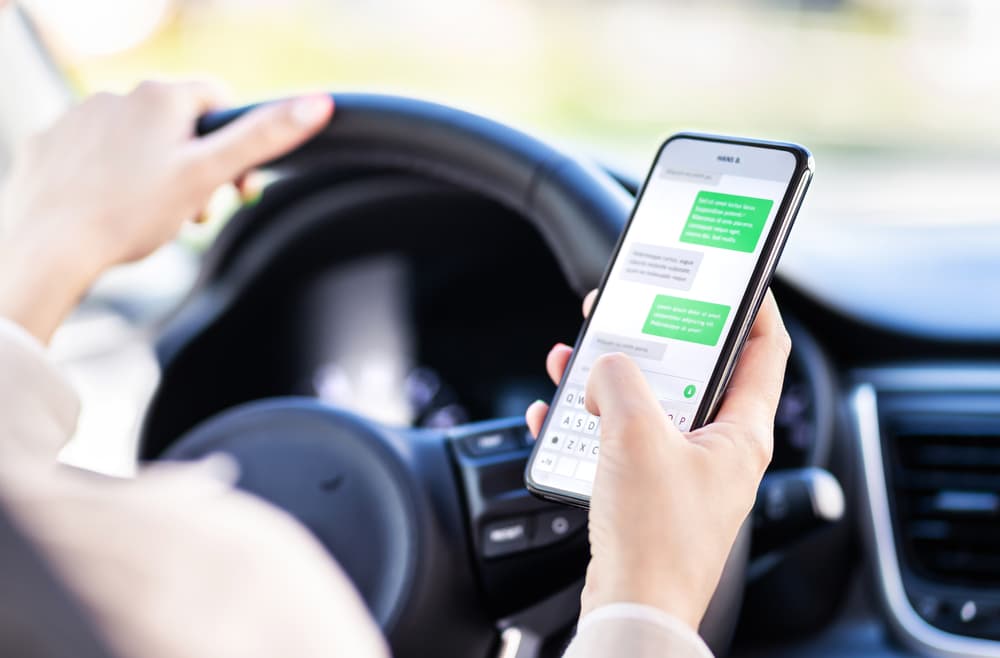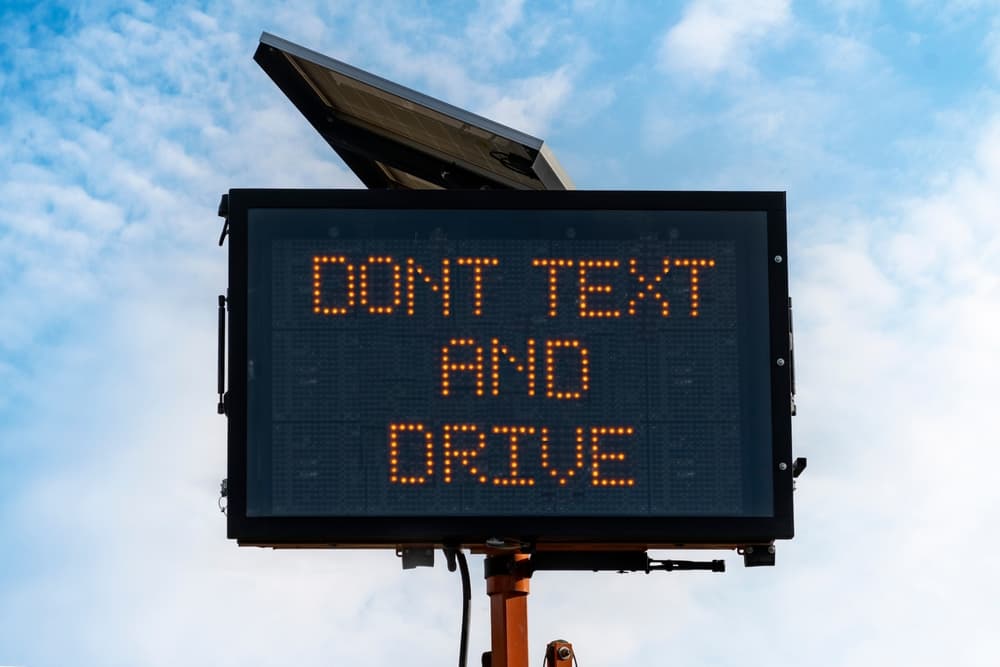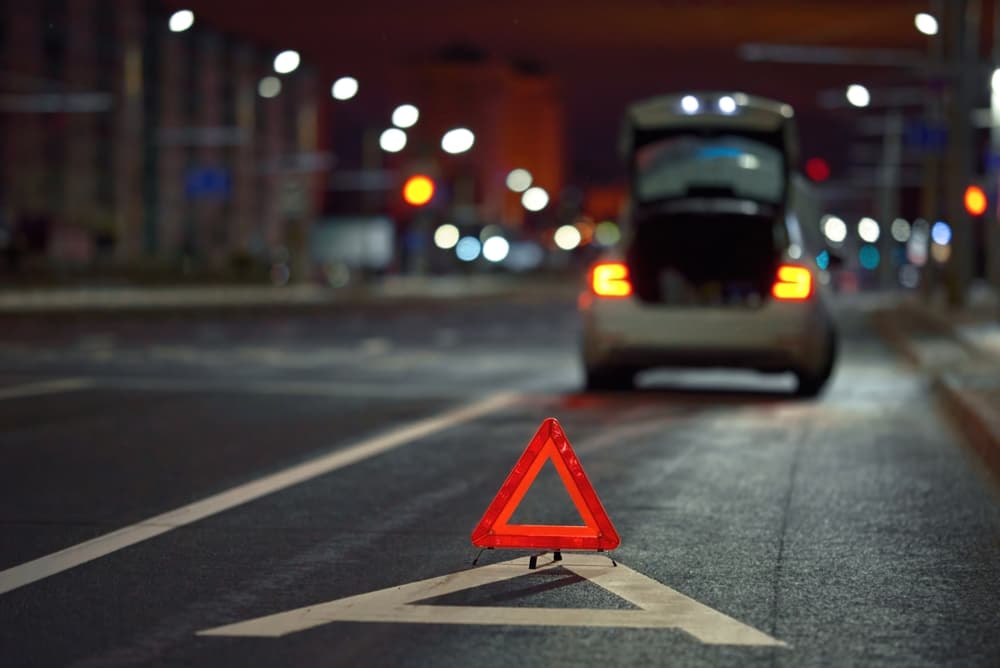Texting and driving have become a major public safety concern in recent years. When drivers take their eyes off the road to send or read a text message, they put themselves and others at serious risk of a devastating accident.
If a collision caused by a driver distracted by texting injured you or a loved one, you have to consult an experienced car accident lawyer about important legal rights and what options you have to consider. In this article, we’ll explain what to do after an accident with a texting driver.
Schedule A Consultation Today!
The Danger of Texting and Driving Accidents
Distracted driving, including texting while driving, has become an epidemic on our roads. According to the National Highway Traffic Safety Administration (NHTSA), distracted driving claimed the lives of 3,308 people in the United States in one recent year alone.

Texting while driving is particularly dangerous, as it involves visual, manual, and cognitive distraction - taking the driver's eyes off the road, hands off the wheel, and mind off the task of driving.
Despite widespread awareness campaigns and laws prohibiting texting while driving in most states, many drivers continue to engage in this risky behavior.
When drivers choose to text instead of focusing on the road, they act negligently and jeopardize innocent lives. If an accident caused by a texting driver injures you, you may seek justice and compensation for your losses.
Common Injuries Resulting from Distracted Driving
Texting and driving accidents can result in a wide range of severe injuries, each with its own unique challenges and long-term consequences.
The potential impacts on your physical, emotional, and financial well-being from a distracted driving accident includes:
- Traumatic Brain Injuries (TBIs): Distracted driving collisions can lead to devastating head injuries, ranging from concussions to life-altering traumatic brain injuries. These types of injuries can result in cognitive impairments, memory loss, and even permanent disability.
- Spinal Cord Injuries: The sudden impact of a texting and driving accident can cause severe damage to the spinal cord, leading to partial or complete paralysis, loss of sensation, and mobility challenges.
- Broken Bones and Fractures: Victims of these accidents often sustain multiple broken bones and fractures, requiring extensive medical treatment, rehabilitation, and, in some cases, permanent assistive devices.
- Internal Injuries: Distracted driving collisions can cause severe internal injuries, such as organ damage, internal bleeding, and ruptured blood vessels, which can be life-threatening if not promptly treated.
- Emotional Trauma: In addition to physical injuries, victims of texting and driving accidents may also suffer from significant emotional trauma, including post-traumatic stress disorder (PTSD), anxiety, and depression.
A lawyer will understand your injuries' full extent and long-term implications as they pursue legal action for you.
By working with experienced personal injury attorneys, your claim will accurately reflect the true impact of the accident on your life and well-being.
Understanding Your Rights in a Texting and Driving Accident
As the victim of a texting and driving accident, you have:
- The Right to Seek Compensation: You can pursue financial compensation from the at-fault driver for your medical expenses, lost wages, pain and suffering, and other damages resulting from the accident.
- The Right to Gather Evidence: You have the right to collect evidence that demonstrates the other driver was texting at the time of the collision, which can help strengthen your case.
- The Right to File a Lawsuit: If the insurance company refuses to offer a fair settlement, a lawyer may file a personal injury lawsuit against the negligent driver.
- The Right to Work with an Attorney: Hire a personal injury lawyer who can protect your interests and fight for the maximum compensation you deserve.
Gathering Evidence in a Texting and Driving Accident Case
Building a strong case against a texting driver can recover the compensation you need.
Some key types of evidence to gather includes:
- Cell Phone Records: Subpoenaing the other driver's cell phone records can provide critical proof that they were actively texting at the time of the accident.
- Witness Statements: Eyewitness accounts from other drivers, passengers, or pedestrians who saw the other driver texting can support your case.
- Police Reports: The official police report detailing the accident can document important details, such as whether the other driver admitted to texting.
- Photographic Evidence: Taking photos of the accident scene, vehicle damage, and your injuries can help demonstrate the severity of the collision.
- Surveillance Footage: If available, video footage from nearby security cameras or dashcams can provide visual proof of the other driver's distracted behavior.
Filing a Personal Injury Claim After a Texting and Driving Accident
Once you gather sufficient evidence, file a personal injury claim with the at-fault driver's insurance company. This typically involves submitting a demand letter outlining your damages and requested compensation amount.
The insurance company will then review your claim and either make a settlement offer or deny your claim.
If the insurance company refuses to offer a fair settlement, you can file a personal injury lawsuit against the negligent driver. This legal action can compel the driver to take responsibility for their actions and provide you with the full compensation you deserve.
Working With an Attorney in a Texting and Driving Accident Case
Work with an experienced personal injury attorney who can protect your rights and fight for the best possible outcome in your case.
An attorney can handle all aspects of your case, including:
- Gathering and preserving critical evidence
- Calculating the full extent of your damages
- Negotiating with insurance companies for a fair settlement
- Preparing and filing a personal injury lawsuit, if necessary
- Representing you in court and arguing your case before a judge and jury
Working with an attorney can give you the best chance of recovering the maximum compensation you deserve for your medical bills, lost wages, pain and suffering, and other damages.
Compensation Options for Victims of Texting and Driving Accidents

If an accident caused by a texting driver injured you, you may recover compensation for:
- Medical Expenses: This can include the cost of emergency medical treatment, hospitalization, rehabilitation, ongoing care, and any necessary assistive devices.
- Lost Wages: You may be able to recover compensation for the income you've lost due to missed work during your recovery.
- Pain and Suffering: You can seek damages for the physical pain, emotional distress, and diminished quality of life resulting from your injuries.
- Property Damage: If your vehicle or other personal property was damaged in the accident, you can seek compensation for the repair or replacement costs.
- Punitive Damages: In some cases, the court may award punitive damages to punish the negligent driver for their reckless behavior.
The compensation you can recover will depend on the unique circumstances of your case.
Pursuing a Lawsuit Against a Texting Driver
If the insurance company refuses to offer a fair settlement, you can file a personal injury lawsuit against the negligent driver. This legal action can compel the driver to take responsibility for their actions and provide you with the full compensation you deserve.
To prevail in a lawsuit, you and your attorney will need to demonstrate that the other driver's texting behavior was the direct cause of the accident and your resulting injuries.
This may involve presenting the evidence you've gathered, such as cell phone records, witness statements, and the police report.
Work with an experienced personal injury lawyer who can navigate the complex and overwhelming legal system on your behalf.
Your attorney will handle all aspects of the litigation, including filing the necessary paperwork, conducting discovery, negotiating with the other side, and representing you in court if the case goes to trial.
Settlement Negotiations in Texting and Driving Accident Cases
In many cases, the insurance company or the negligent driver's legal team may offer a settlement out of court to avoid the time and expense of a trial.
Your personal injury attorney will play a critical role in these settlement negotiations, working to secure the maximum compensation possible for your damages.
During the settlement process, your attorney will review any offers made by the other side and advise you on whether they offered a fair and reasonable settlement given the circumstances of your case. They will also counter with a higher demand if the initial offer fails to meet your needs.
Accepting a settlement offer typically means waiving your right to pursue further legal action. Your attorney can help you weigh the pros and cons of accepting a settlement versus taking your case to trial.
Going to Trial in a Texting and Driving Accident Case
Your case may proceed to trial if you cannot reach a fair settlement.

During the trial, your personal injury attorney will present evidence, call expert witnesses, and argue your case before a judge and jury. They will work to prove that the other driver's negligent texting behavior caused the accident and your resulting injuries.
An experienced attorney will prepare to advocate for your rights and interests effectively at trial. If you prevail, the court may award you damages for your medical expenses, lost wages, pain and suffering, and other losses.
If an accident caused by a texting driver injured you or a loved one, a lawyer can explain your legal rights and options.
Get your free consultation with the experienced personal injury attorneys at Lulich & Attorneys today to discuss your case and learn how we can pursue the compensation you deserve.
The Insurance Company of the Defendant Will Try to Undermine Your Claim
After a texting and driving accident, the insurance company representing the negligent driver will likely go to great lengths to minimize their liability and reduce the compensation you receive.
They may employ a variety of tactics to undermine your claim, including:
- Disputing the Cause of the Accident: The insurance company may attempt to argue that the accident was not caused by the driver's texting behavior, but rather by other factors, such as poor road conditions or your own actions.
- Questioning the Severity of Your Injuries: Insurance adjusters may try to downplay the severity of your injuries, claiming that they are not as serious as you have reported or that they are pre-existing conditions.
- Delaying the Claims Process: Insurance companies may purposefully drag out the claims process, hoping that you will become frustrated and accept a lower settlement offer.
- Offering a Quick, Low-Ball Settlement: In the aftermath of the accident, the insurance company may attempt to offer you a quick settlement, which is often significantly less than what you are entitled to.
- Surveillance and Investigations: The insurance company may conduct surveillance or investigations into your daily activities, social media, and medical history to find any inconsistencies or discrepancies that could undermine your claim.
To combat these tactics and ensure that you receive the full and fair compensation you deserve, work with an experienced personal injury attorney who can navigate the legal system, negotiate with the insurance company, and advocate for your rights.
Schedule a Consultation with Lulich & Attorneys
At Lulich & Attorneys, we have a proven track record of successfully representing clients who distracted drivers have injured.
Our team of personal injury lawyers fights for the rights of texting and driving accident victims and helps them recover the maximum compensation possible.
We understand the physical, emotional, and financial toll that a texting and driving accident can take, and we'll work tirelessly to ensure you receive the justice and support you need.
Don't wait to take action. Contact Lulich & Attorneys today for your consultation and get started on the path to recovery.
